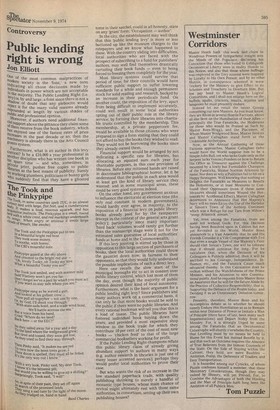ControversY
Public lending right is wrong
Jon Elliott
uf the most common malpractices of
odern society is the 'foist,' a new term it'Idicating all those decisions made by Individuals in power which are not acceptable to the majority, The Public Lending Right (i.e. le,vY) is, by and large, a foist since there is not a snadow of doubt that any plebiscite would reject it for the many valid reasons already exPounded at length " by various shades of Public and professional opinion. Moreover, if authors need additional financ„1.41suPport above the pittance they claim some ';'.1 them receive from the book industry, which enjoyed one of the fastest rates of price Increases in the past decade or so; then the rnachinery is already there in the Arts Council grants system. Furthermore, what is an author in this levy "cintext? Is he a £10,000 a year professional in ia.t.i.other discipline who has written one book in sPare time — and who, sometimes, in rate print, pushes free copies to public raries as the best means of publicity. Surely :working plumbers, politicians or bunny girls no suddenly find that they have a ghosted
tome in their satchel, could in all honesty, state on any 'grant' form: 'Occupation — author'.
In the city, the establishment may well think that this 'public lending levy' is more or less buttoned up like the museum charges to the ratepayers and we know what happened to these. With the country sliding into difficulties, local authorities who are faced with the prospect of subscribing to a fund for publishers' authors, may well find themselves drastically curtailing their book funds — even to being forced to freezing them completely for the year.
Most library systems could survive that period of time; for their councils would have sufficient public support to suffer lowering standards for a while and enough permanent stock for solid reading and research, backed by an increase in their periodicals fund. On another count, the imposition of the levy, apart from being difficult to implement accurately, could well result in some local authorities opting out of their public role in the library service; by forming their libraries into charita ble trusts controlled by the membership. This membership, at a private peppercorn fee, would be available to those citizens who were prepared to sign a form stating that they could not afford to buy the books they wished to read. They would not be borrowing the books since they already owned them. Financial support would be arranged by not indicating a specific rate for libraries, but
allocating an equated sum each year for charitable purposes, in this case provision of libraries. Before any mittened hands are raised in doctrinaire bibliographical horror, let it be understood that the public in each area would at least get the kind of library service they wanted: and in some municipal areas, these could be very good systems indeed.
On the other hand, any government anxious to influence the electorate at election time (the only real constant in modern government), would hardly ever agree, in majority, to the imposition of a financial levy on public library books already paid for by the ratepayers (except in• the context of the general arts grant policy); particularly since many important 'hard back' volumes would rarely get further than the manuscript stage were it not for the • estimated sales guarantee of local authorities' funds at home and in the Commonwealth. If this levy jousting is stirred up by those in opposition to this large section of purchasers of books, then the local authorities could throw the gauntlet down now; in fairness to their opponents, so that they would fully understand the possible implications of such a direct levy. Here one recalls the slow start of the municipal boroughs etc to act in concert over public library control, which lost most of them the day, even though the majority of public opinion desired their kind of local autonomy. Furthermore, what is the basic argument for a public lending right levy? Since publishers and many authors work on a commercial basis, it can only be. that more books would be sold to the public if there were no public libraries. And every rational bookman will tell you that this is a load of tissue. The public libraries have fostered individual 'book buying down the years; and provided a most expensive shop window to the book trade for which they contribute 10 per cent of the cost of most new books — 'chicken feed' to that of the large commercial booksellers working for profit. If the Public Lending Right champions refute this public library claim of already giving abundant support to authors in many ways (e.g. author research in libraries is just one of many lesser accented services); perhaps they would prefer local authorities to prove their case.
But who wants the risk of an increase in the low standard paperback trade, with quality publishing shrinking to merely a handful of monastic type houses, whose main chance of revival might ultimately rest with those same authorities, in consortium, setting up their own publishing houses?


































 Previous page
Previous page